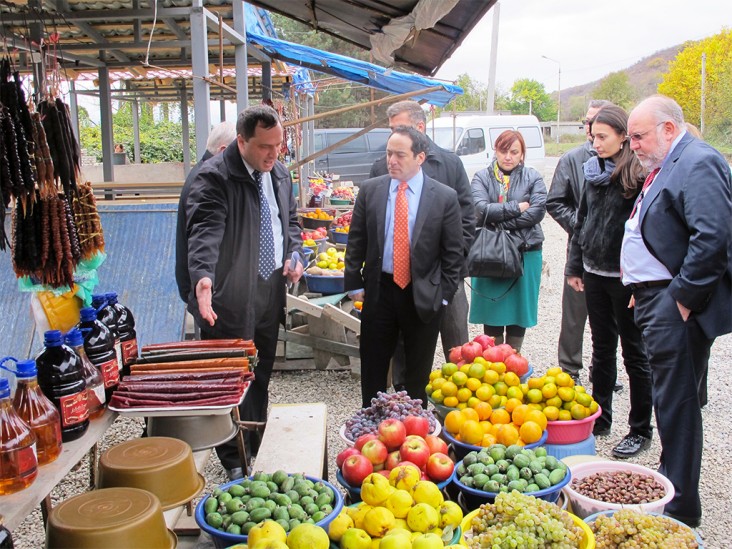
Along with USAID/Caucasus Mission Director, Stephen Haykin, on October 29th, 2014, I visited several sites of the New Economic Opportunities (NEO) project in the Mtskheta-Mtianeti region. Our visit to the region highlighted the strong U.S. economic support for Georgia and the importance of the agriculture sector to Georgia’s future. During my visit, I met local farmers at a rehabilitated agrarian market in the village of Tsitelsopeli, on the northern “military” highway. Thanks to USAID’s assistance, almost 70 residents of adjacent villages sell their farm products.
Next, we stopped and viewed the Narekvavi irrigation channel, which USAID recently rehabilitated through this project. The channel provides water to five villages, irrigates 350 hectares of agricultural land, and benefits over 550 households. I witnessed firsthand how USAID’s NEO project increases rural incomes, reduce poverty, and improve food security in the area. In 2014, as Russian troops continued installing permanent fences to demarcate the occupied territories of Georgia’s breakaway region of South Ossetia, USAID through NEO provided targeted assistance to affected communities. USAID’s support will increase the resilience of communities located along the administrative boundary lines with the breakaway region.
Next, we went to a livestock feed production facility in the nearby village of Shuakhevi. Through the assistance of the NEO grant, and a commercial bank loan through the Government of Georgia’s Agricultural Credit Program, a local entrepreneur purchased hay processing machinery, a granulator, a maize chopper, and packing machinery. This provided an outlet for local farmers to sell corn and other products.
The following day, I was honored to co-chair the U.S.-Georgia Strategic Partnership Commission’s Economic, Energy, and Trade Working Group Meeting. Georgia is making great strides toward Euro-Atlantic integration, as is evident through the ratification of the Deep and Comprehensive Free Trade Area (DCFTA), as part of the Association Agreement with the European Union this past July. This agreement creates new possibilities for increased Georgian trade and economic development within the region, the European Union (EU), as well as a broader worldwide market. Georgia’s legislative achievements and economic reforms, along with the implementation and enhancement of these important laws and regulations, are instrumental in its path to Euro-Atlantic integration. USAID is working closely with the Government of Georgia (GOG) to increase economic growth and attract foreign investment.
One particularly interesting topic during the U.S. - Georgia working group discussion was on Intellectual Property Rights (IPR). I was able to highlight USAID’s extensive cooperation with the GOG to improve innovation, science and technology, and the enforcement of IPR. Recently, USAID and the U.S. Department of Commerce engaged GOG partners to develop software for intellectual property registration. For example, USAID supported the Georgian agency responsible for IPR issues, while the Department of Commerce, through the Commercial Law Development Program (CLDP), held a four-day workshop/training in Batumi for 24 judges on adjudicating cybercrime and trademark and copyright infringement cases.
During my visit, I had the great honor of meeting and President Margvelashvili and Prime Minister Garibashvili, expressing U.S. support for Georgia’s deepening integration with the EU. The U.S. government has a long history of supporting Georgia in developing its democratic institutions and increasing stability and economic growth. Our support for Georgia – including its territorial integrity and sovereignty – remains steadfast.
I look forward to my next visit to Georgia.







Comment
Make a general inquiry or suggest an improvement.